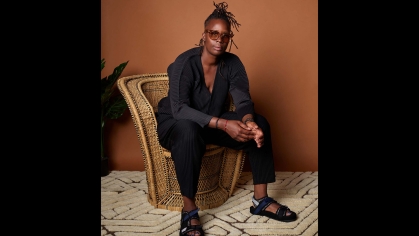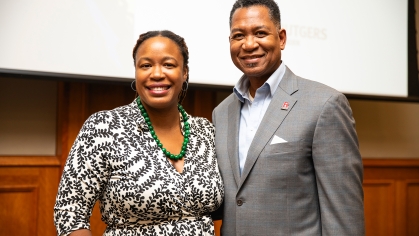Law School Graduate Aims to Make An Impact in Criminal Justice Reforms and Civil Rights

Witnessing injustices against Black and Latinx people while working at law enforcement and government agencies convinced Morgan Humphrey to pursue a career in fighting for equality and justice.
As a policy coordinator for the Drug Policy Alliance in Los Angeles, a nonprofit organization that aims to combat the war on drugs through policy change, Humphrey developed advocacy skills by campaigning and lobbying for drug policy and criminal justice reform legislation. “I learned about the added impact our criminal justice system has on the immigrant community through the threat of deportation and the perpetuation of racist narratives in order to further surveil and criminalize the Latinx community,” Humphrey explains. The experience solidified her commitment to criminal justice reform and led her to Rutgers Law School in Camden.
“I saw how criminalization was handed down to individuals based on socioeconomic and racial factors, more than actual justice or harm,” says Humphrey, a 2021 Rutgers Law graduate.
As a social justice scholar at Rutgers Law, Humphrey connected with the Camden-area community through pro bono projects, including assisting low-income clients to prepare and file bankruptcy petitions, monitoring and volunteering with the Camden County Board of Elections on Election Day, and working with the Drug Policy Alliance and the American Civil Liberties Union.
After George Floyd was killed by a Minneapolis police officer, Humphrey felt compelled to join the first peaceful protest in Philadelphia. When police became aggressive with the crowd, she used her knowledge of the law to protect protesters’ rights.
Humphrey intervened to hold back a protester after one officer shoved his bicycle against the protesters. “I wanted to make sure people didn’t respond in a way that would allow police to do to us exactly what we were protesting,” she recalls. In response to the officer’s action, one man lunged toward the officer. Humphrey held the protester back and instructed him not to touch the officer. “I know there is a low bar for what is resisting arrest or assault of a police officer,” says Humphrey. “Once you are deemed as resisting a police officer, or trying to resist their command, that gives them justification to use force, per our Supreme Court jurisprudence on excessive force.”
The Ewing native is hopeful for progress in the future, following the global racial reckoning.
“I do feel that there is a possibility for significant change with greater awareness and growing demands for substantive changes, such as redirecting the police budget funding to social services,” says Humphrey. “But it is a shame that it takes someone dying for some people to recognize that we have rights that should not be violated.”
Humphrey begins her first post-law school job this summer as a clerk for New Jersey Superior Court Appellate Division Judge Thomas Sumners.
In the future, she hopes to work on civil rights litigation or policy work involving police brutality and prisoners’ rights.


